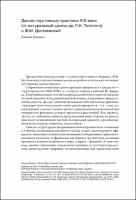Chapter Деконструктивные практики XIX века (от натуральной школы до Л.Н. Толстого) и Ф.М. Достоевский
Author(s)
Borowski, Marcin
Kazakov, Alexey
Language
RussianAbstract
Deconstruction in the 19th Century (from the Natural School to Leo Tolstoy) and Fyodor Dostoevsky. The modern understanding of deconstruction arose from post-structuralism and implies distrust of semblance, the outward appearance of any ideology or structure, together with the search for a hidden interior. Dostoevsky renounces one-dimensionality and shows its deconstructing nature. He considers it a prejudice to believe that disclosing the hidden and forbidden has more “truth” in it, as is evident from his dispute with Tolstoy, who uses the principle of exposing the ignoble background of a supposedly noble national ideology to criticize the “defenders of the Slavic brothers” in Anna Karenina. Dostoevsky refuses to recognize the results of deconstruction (the denial of the declared) as the last and only version of the truth about reality. His approach can be defined as the “deconstruction of deconstruction.”
Book
Ф.М. Достоевский: Юмор, парадоксальность, демонтаж; Ф.М. Достоевский: Юмор, парадоксальность, демонтажKeywords
deconstruction; Dostoevsky and the Natural School; Dostoevsky and Leo Tolstoy; specificity of Dostoevsky’s realism; artistic model of truthDOI
10.36253/979-12-215-0122-3.05ISBN
9791221501223, 9791221501223Publisher
Firenze University PressPublisher website
https://www.fupress.com/Publication date and place
Florence, 2023Series
Biblioteca di Studi Slavistici, 52Classification
Biography, Literature and Literary studies


 Download
Download Web Shop
Web Shop